Posts Tagged ‘badges’
An LMS to Support ‘Gameful’ Learning
Seeking to bring the qualities of well-designed games to pedagogical assessment, the University of Michigan created a learning management system that uses gaming elements such as competition, badges and unlocks to provide students with a personalized pathway through their courses.
By David Raths 08/24/16
https://campustechnology.com/articles/2016/08/24/an-lms-to-support-gameful-learning.aspx
UM School of Information and School of Education
a new type of learning management system called GradeCraft. GradeCraft borrows game elements such as badges and unlocks to govern students’ progress through a course. With unlocks, for example, you have to complete a task before moving to the next level.
Written in Ruby on Rails and hosted on Amazon Web Services, GradeCraft was created by a small team of students and faculty with additional software support from Ann Arbor-based developer Alfa Jango. Their work received support from UM’s Office of Digital Education and Innovation and the Office of the Provost. GradeCraft can work as a stand-alone platform or in conjunction with a traditional LMS via the LTI (Learning Tools Interoperability) protocol.
Here is how it works: Instructors create a course shell within GradeCraft (similar to the process with any LMS). Students use a tool called the “Grade Predictor” to plan a personalized pathway through the course, making predictions about both what they will do and how they will perform. When assignments are graded, predictions turn into progress; students are then nudged to revisit their semester plan, reassessing what work is available and how well they need to do to succeed overall. Students are able to independently choose an assessment pathway that matches their interests within the framework of learning objectives for the course.
++++++++++++++
more on LMS in this blog
https://blog.stcloudstate.edu/ims?s=gaming
more on gaming in this blog
https://blog.stcloudstate.edu/ims?s=lms
more on badges in this blog
https://blog.stcloudstate.edu/ims?s=badges
Badging: Not Quite the Next Big Thing
While badging and digital credentialing are gaining acceptance in the business world and, to some extent, higher education, K-12 educators — and even students — are slower to see the value.
By Michael Hart 07/20/16
https://thejournal.com/articles/2016/07/20/badging-not-quite-the-next-big-thing.aspx
That’s when the MacArthur Foundation highlighted the winning projects of its Badges for Lifelong Learning competition at the Digital Media and Learning Conference in Chicago. The competition, co-sponsored by the Bill & Melinda Gates Foundation and the Mozilla Foundation, had attracted nearly 100 competitors a year earlier. The winners shared $2 million worth of development grants.
Evidence of Lifelong Learning
A digital badge or credential is a validation, via technology, that a person has earned an accomplishment, learned a skill or gained command of specific content. Typically, it is an interactive image posted on a web page and connected to a certain body of information that communicates the badge earner’s competency.
Credly is a company that offers off-the-shelf credentialing and badging for organizations, companies and educational institutions. One of its projects, BadgeStack, which has since been renamed BadgeOS, was a winner in the 2013 MacArthur competition. Virtually any individual or organization can use its platform to determine criteria for digital credentials and then award them, often taking advantage of an open-source tool like WordPress. The credential recipient can then use the BadgeOS platform to manage the use of the credential, choosing to display badges on social media profiles or uploading achievements to a digital resume, for instance.
Finkelstein and others see, with the persistently growing interest in competency-based education (CBE), that badging is a way to assess and document competency.
Colorado Education Initiative, (see webinar report in this IMS blog https://blog.stcloudstate.edu/ims/2016/06/20/colorados-digital-badging-initiative/)
There are obstacles, though, to universal acceptance of digital credentialing.
For one, not every community, company or organization sees a badge as something of value.
When a player earns points for his or her success in a game, those points have no value outside of the environment in which the game is played. For points, badges, credentials — however you want to define them — to be perceived as evidence of competency, they have to have portability and be viewed with value outside of their own environment.
+++++++++++++++++++++++
More on badges in this IMS blog:
https://blog.stcloudstate.edu/ims?s=badges
Link to the archived session:
http://www.nrocnetwork.org/professional-development/webinar
“Colorado’s Digital Badging Initiative: A New Model of Credentialing Technical Math Skills and More”.
Educators and innovative industry leaders agree that digital badges are evolving into a key credential that can be used to meet current education and workforce needs. As part of its TAACCCT grant, the Colorado Community College System is leading a collaborative effort to develop micro-credentials or digital badges to serve post-secondary and workforce in partnership. Learn about early pilot uses of digital badges in technical math and advanced manufacturing, as well as plans for the future. The presenter will also share perspectives garnered from her participation in the Badge Alliance/OPEN badges workgroup that is shaping the national conversation on this emerging topic.
Presenter: Brenda Perea, Instructional Design Project Manager, Colorado Community College System
Plan to log on 15 MINUTES BEFORE THE HOUR so you will be up and running before the webinar begins. (It may take a few minutes to download the software to your computer.)
We will begin the webinar promptly at 2:00 PM ET (1 CT/12 MT/11 PT) on Thursday, June 23.
Please send your questions, comments and feedback to: memberservices@theNROCproject.org
How To Join The Webinar
Thu, Jun 23, 2016 1:00 PM – 2:00 PM CDT
Add to Calendar: Outlook® Calendar | Google Calendar™ | iCal®
1. Click the link to join the webinar at the specified time and date:
https://global.gotowebinar.com/join/7204276536935317252/397462206
Before joining, be sure to check system requirements to avoid any connection issues.
Note: This link should not be shared with others; it is unique to you.
2. Choose one of the following audio options:
TO USE YOUR COMPUTER’S AUDIO:
When the webinar begins, you will be connected to audio using your computer’s microphone and speakers (VoIP). A headset is recommended.
–OR–
TO USE YOUR TELEPHONE:
If you prefer to use your phone, you must select “Use Telephone” after joining the webinar and call in using the numbers below.
United States: +1 (914) 614-3221
Access Code: 330-025-475
Audio PIN: Shown after joining the webinar
Webinar ID: 148-791-923
If you are new to GoToWebinar, we suggest that you click the link below and run the GoToWebinar configuration test to ensure your computer is ready to access this online meeting environment.
http://tinyurl.com/GTWtest
If you are using older operating systems, you may need to use GTW web access rather than the desktop application and possibly phone in for audio. See http://bit.ly/1VVCeno for more info.
If you experience problems entering the GoToWebinar room, or with the online tools during the session, please send an email to memberservices@thenrocproject.org.
This webinar will be archived in the “Professional Development” area of the NROC Network at http://www.nrocnetwork.org/professional-development/webinar.
We look forward to your participation.
Sincerely
The NROC Team
webinar
http://www.nrocnetwork.org/colorados-digital-badging-initiative-new-model-credentialing-technical-math-skills-and-more
badges are integrated with the industry partners of the educational institution
how to determine the value of a badge.
Faculty writing a competencies, online and blended environment. All agree that this means competency. Need to faculty buy in, if issuing badges. Objective versus subjective measures. Faculty member is the one who tells students how to earn badges. Not punitive, but a reward.
building the eco system in Colorado. But it can be taken on a national level. Employers in other states to accept. MS, Sisco are issuing badges, which will be internationally.
how does it fit in the bigger picture of credentials. Lumina Foundations. Next project. https://www.luminafoundation.org/
MOOC (Canvas)
Microsoft badging system. https://education.microsoft.com/ViewAll/Badges
brenda.perea@cccs.edu
NROCnetwork.org http://nrocnetwork.org/
badges are transferable. not person to person, but repository
of 200 issues badges, they were shared 6K+ times over social media: LinkedIn, FB etc. by employers.
backpack, or stored in Mozilla backpack. Most of LMS developing badging capabilities.
some LMS want to create their own badging, gatekeep in LMS, but losing
Canvas allows any badging
LCI in any LMS. LMS allow the vehicle to be issued, but does not create it.

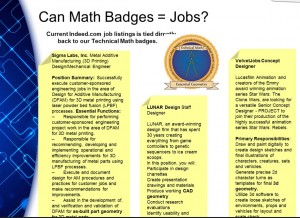



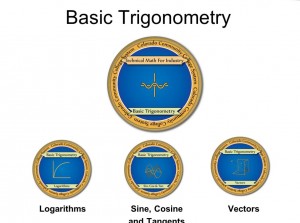

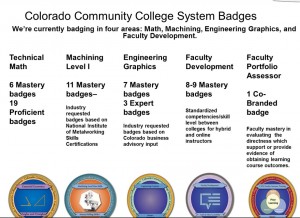
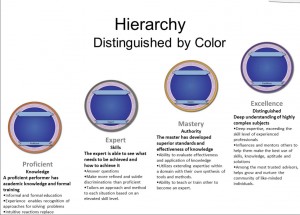
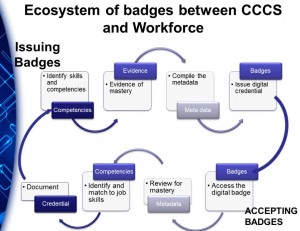
https://www.pinterest.com/pin/335729347203540627/
++++++++++++++++++++++++++++++++++++
More on gamification in this IMS blog:
https://blog.stcloudstate.edu/ims?s=gamification
4 Great Curation Tools Created by Teachers for Teachers
http://www.educatorstechnology.com/2016/04/4-great-digital-curation-tools-created.html
April 28, 2016
Edshelf
Edshelf is ‘a socially curated discovery engine of websites, mobile apps, desktop programs, and electronic products for teaching and learning. You can search and filter for specific tools, create shelves of tools you use for various purposes, rate and review tools you’ve used, and receive a newsletter of tools recommended by other educators.
Graphite
a free service from nonprofit Common Sense Education designed to help preK-12 educators discover, use, and share the best apps, games, websites, and digital curricula for their students by providing unbiased, rigorous ratings and practical insights from our active community of teachers
Scoop.it
find out content related to your topics by ‘reviewing your suggestion lists and the topics from other curators
educlipper
social learning platform that allows teachers to curate and share educational content. Some of the interesting features it provides include: ‘Explore top quality education resources for K-12, create clips from the web, Drive, Dropbox, use your camera to capture awesome work that you create in and out of the classroom, create whiteboard recordings, create differentiated groups and share content with them, create Personal Learning Portfolios, create Class Portfolios as a teacher and share Assignments with students, provide quality feedback through video, audio, text, badges, or grades, collaborate with other users on eduClipboards for class projects or personal interests
Our discussion:
++++++++++++++++++++++++
Main speaker: Ken Chapman
mapping what students are looking at the screen
intelligent agent: dancing hamster
immediate gratification – certification, this is practically badges
story builder – D2L tool
D2L dropbox – look previous assignments and submissions within dropbox
time savers: 1. miss an assignment deadline – use agent. My note: how does it roll over? how much time and effort to condition it after it is rolled over?
text expanders: create codes in the browsers to evoke repetitions (;runon)
“Daylight Experience” is the D2L new look and feel put on D2L. nice clean modern looking.
Mobile First, API Access, Assessments, Advanced CBE (competency-based education programs), Predictive Analytics (recommendation system to pick right course, red flags, Dashboards,
Content:
interactive publisher material. Dates and Feeds on Mobile, Curriculum Planning
Capture: my note – how does it fit with MediaSpace
ePortfolio my note – how does it fit TK-20
Repository – open content, publishers, how to bring easier into a course
Adaptive learning
D2L purchased a module. publisher packets, adaptive textbooks. D2L looks at it as an engine where faculty feeds the idea and the engine is making the links and structuring the ideas into content. It also the engine checks what learners already know and based on results finds knowledge gaps.
need well defined learning objective, good content and ways to assess the material.
Start with creating support course delivery, test preparation.
Digital Badges in Education: Trends, Issues, and Cases.
https://www.routledge.com/products/9781138857605
In recent years, digital badging systems have become a credible means through which learners can establish portfolios and articulate knowledge and skills for both academic and professional settings. Digital Badges in Education provides the first comprehensive overview of this emerging tool. A digital badge is an online-based visual representation that uses detailed metadata to signify learners’ specific achievements and credentials in a variety of subjects across K-12 classrooms, higher education, and workplace learning. Focusing on learning design, assessment, and concrete cases in various contexts, this book explores the necessary components of badging systems, their functions and value, and the possible problems they face. These twenty-five chapters illustrate a range of successful applications of digital badges to address a broad spectrum of learning challenges and to help readers formulate solutions during the development of their digital badges learning projects.

++++++++++++++++++++++
Badges and Leaderboards: Professional Developments for Teachers in K12
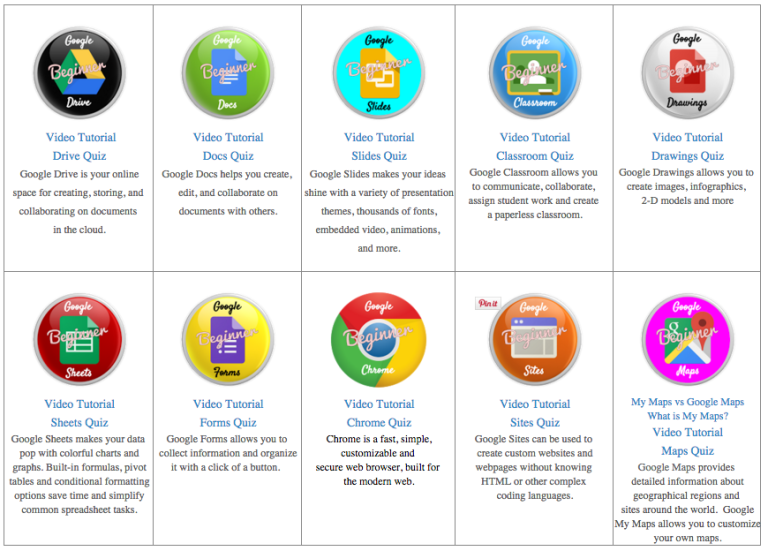
http://www.shakeuplearning.com/blog/more-ideas-for-badges-in-professional-learning/
Why should I bother earning badges?
http://www.connectededucators.org/cem-digital-badges-faq/
++++++++++++++++++++++
Canvas Badges:
https://canvas.instructure.com/courses/904071
++++++++++++++++++++++++
Edmodo Badges:
http://www.helloliteracy.com/2012/09/technologically-speaking-currently.html
+++++++++++++++++++++
issues to consider:

++++++++++++++++++++++++
More on badges and gaming in education in this IMS blog:
https://blog.stcloudstate.edu/ims/?s=badges&submit=Search
Midwest Regional Conference at Notre Dame
http://www.aaeebl.org/?page=notre_dame_2016
The Conference at Notre Dame May 12-13 is intriguing as you can see from some of the session titles below. It’s time to register and book lodging.
How do we know they are learning? Digital Evidence of and for Learning
Peruse the titles below to get an idea of the dynamism of this eportfolio conference:
- Balancing Summative, Formative, and Transformative ePortfolio Functions within Participatory Learning and Assessment
- Competency Based Badging and ePortfolios for the Youth and Adult Workforce in Philadelphia
- Show your SPuRS: Bridging Academics and Co-Curricular Professional Readiness
- Buckeye Badges: A Pilot Project at Ohio State University
- Developing an Integrative Toolkit for Engagement at Michigan (iTeam)
- Ethics, ePortfolios, and Badges: Envisaging Privacy and Digital Persistence in Student-Level Learning Evidence
- Balancing Summative, Formative, and Transformative ePortfolio Functions within Participatory Learning and Assessment
Plus 15 other sessions.
The keynote address will be given by Daniel T. Hickey on Open Digital Badges + ePortfolios: Searching for and Supporting Synergy. an internationally-known speaker and leader on the changes in higher education around digital technologies.
Here is a description of another session:
By sharing challenges, practices, and examples of maker portfolios, we highlight the importance of makerspaces and community development in the design of portfolios that capture rich learning.
These are the institutions represented in the program:
- Grand Valley State University
- Rose-Hulman Institute of Technology
- Indiana University
- Notre Dame
- University of Michigan
- IUPUI
- Ohio State University
- Kendall College; Laureate Universities
- Boston University
- Western Michigan University
- Drexel University
- University of Charleston
The full program will be posted by late Thursday of this week. This is a must-attend event to know about the latest developments in the eportfolio field.
Registration rates (note that AAEEBL members receive a $100 discount on registration; a student rate is available as well):
Registration Fees:
Non-Member Registration
$250 before April 25
$290 after April 25
Member Registration
$150 before Aprial 25
$190 after April 25
Student Registration
$75 before Aprial 25
$115 after April 25
Includes 2 breakfasts, one lunch and one reception. One and a half days of sessions.
Register now. Book lodging. Notre Dame is just outside of Chicago in Northern Indiana. Midway Airport is probably the closest major airport to the Notre Dame campus. Conference facilities at Notre Dame are excellent — lodging and conference space are adjacent.
+++++++++++++++++++++++++
More on badges in this IMS blog:
https://blog.stcloudstate.edu/ims/?s=badges&submit=Search
More on eportfolio in this IMS blog:
https://blog.stcloudstate.edu/ims/?s=eportfolio&submit=Search
| Proportion of Content
Delivered Online |
Type of Course
|
Typical Description
|
|
0%
|
Traditional
|
Classroom-based teaching with assignments and activities which students pursue independently of each other. |
|
1 to 29%
|
Web Facilitated
|
Web resources and technologies are used to facilitate what is essentially a face-to-face course. May use webpages and course management systems (CMS) to post syllabuses, readings and assignments. |
|
30-79%
|
Blended / Hybrid
|
Course blends online and face-to-face delivery. Substantial parts of the content are delivered online and discussions, team projects and activities and web safaris are used for learning. The number of face-to-face sessions is decreased as the volume of online activity increases. |
|
80+%
|
Online
|
A course where all, or almost all, of the content is delivered online with no or a very small number of face-to-face meetings. |
- Synchronous learning
- Asynchronous learning
Flipped Classroom
Competency-Based Learning
open learning
Flexible learning (badges)
Gamification
Immersive Learning Environments
Adaptive Learning and Assessment
Systems
Simulation
Immersive Tutoring |
++++++++++++++++++
Glossary of Online Learning Terms http://theelearningcoach.com/resources/online-learning-glossary-of-terms/
E-Learning Terms
http://www.bpcc.edu/educationaltechnology/glossary.html
U Massachusetts Launches its First Online Badge Program
https://campustechnology.com/articles/2016/03/17/u-massachusetts-launches-its-first-online-badge-program.aspx
By Joshua Bolkan, 03/17/16
The University of Massachusetts’ online consortium, UMassOnline, has launched its first non-credit badge program.
Teaching with Call of Duty, World of Warcraft Subject of New Penn State Course
https://thejournal.com/articles/2016/03/18/teaching-with-call-of-duty-world-of-warcraft-subject-of-new-penn-state-course.aspx
By Dian Schaffhauser, 03/18/16
“Gaming 2 Learn,” part of Learning Design & Tech, is being offered online to current and future educators through the university’s World Campus. Instructor Ali Carr-Chellman, who once published an article on the Huffington Post titled, “We Need More Games in Schools,”
Students who participate in the course will do a project in which they pick a commercial game and describe how it integrates with their chosen content area. They also need to watch kids play their favorite games and play alongside them, then reflect on those experiences.
More on gaming in this blog:
https://blog.stcloudstate.edu/ims/?s=gaming&submit=Search
more on badges in this blog:
https://blog.stcloudstate.edu/ims/?s=badges&submit=Search











